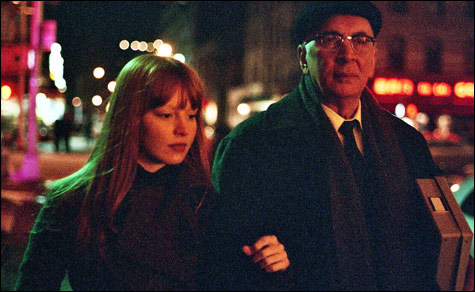
STARTING OUT IN THE EVENING: Not much Jewish content, but Lauren Ambrose and Frank Langella are enormously watchable. |
| “The 19th Annual Boston Jewish Film Festival” | Museum of Fine Arts + Coolidge Corner Theatre + Institute of Contemporary Art + Arlington Capitol + West Newton + Other Venues: November 1-11 |
Ostensibly an annual plunge into the Jewish diaspora as it has taken seed all over the planet, the Boston Jewish Film Festival has always been more about the tenuous experience of that global community than about great films. As it is, I’ve yet to see a “great” Israeli film — Amos Gitai’s Kippur comes closest — and only a handful of American films could be said to qualify. But what is a “Jewish film”? The festival has tended to throw its net almost meaninglessly wide; the sparest mention of or relation to Jewish character or history is more than enough.Andrew Wagner’s STARTING OUT IN THE EVENING (MFA: November 8 at 7:30 pm, with the director present) has only its protagonist’s surname — Schiller — to recommend it as Jewish (something that might’ve surprised Friedrich Schiller). It may also be the fest’s most thoroughly adult movie: based on Brian Morton’s novel, the all-digitally-shot film centers on an aging, obsessive, out-of-print New York novelist (Frank Langella) who’s beset by a luscious and ambitious grad student (Lauren Ambrose) who wants not only to write her master’s thesis about him but also to insinuate herself into his life, his history, and his bed. The textures are sometimes coy (too much comfortable soundtrack piano doodling, too much should-be-satiric lit chat), but the story bumps into very sophisticated territory along the way, and Wagner leaves out the obvious scenes we’re half-expecting, letting the characters live in a three-dimensional, off-screen world. Most of all, the film has two enormously watchful actors; Langella is probably physically incapable by now of allowing any dialogue to sound trite, and when he rises to a boil, it’s restrained, old-school performance thrills at their rarest.
Enjoying perhaps only a respite from Holocaust documentaries, the fest’s non-fiction prioritizes the here and now, in Shimon Dotan’s HOTHOUSE (Coolidge Corner: November 4 at 8 pm), a full-frontal portrait of Israel’s enormous Palestinian prisoner population, all living in what a Fatah leader calls “universities of Palestinian nationalism,” and in Uri Rosenwaks’s THE FILM CLASS (Coolidge Corner: November 4 at 4 pm, with the director present), which follows a group of vivacious Afro-Bedouin women living in the Negev desert in their efforts to make a film about their own heritage — which turns out to lead back to slavery at the hands of “white” Bedouin less than a century earlier. Both are powerful and personally involving documentaries, if inconclusive and less than incendiary.
They’re better, in any case, than most of the fiction features, which tend toward cutesy-pie Borscht Belt cliché and rampant sentimentality. Joseph Cedar’s BEAUFORT (ICA: November 8 at 7 pm; MFA: November 10 at 7 pm) has the toughest skin of the lot. A combat-zone saga set on the Lebanese front in 2000, just as Israeli forces decide to withdraw, it boils down to a study in disenchantment, as a platoon of bored and spoiled soldiers occupying the title castle ponder basic war-movie questions (what and why) as they watch TV while bombs occasionally take out chunks of architecture. Cedar makes interesting use of the pre-fab hexagonal tunnel/bomb-shelter warren the soldiers live in, but the characters are drab and the dilemmas timeworn.